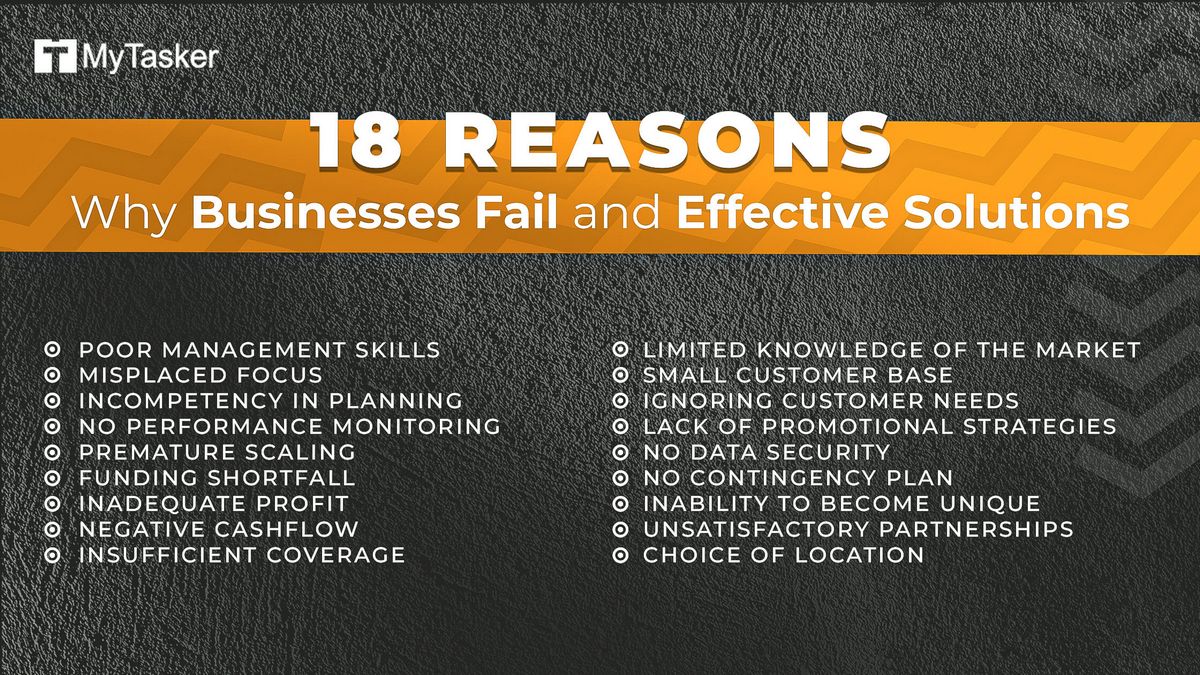
6 Reasons Why Small Businesses Fail and How to Avoid Them
About 20% of small businesses fail in their first year, according to recent U.S. Bureau of Labor Statistics data. 50% fail in the first five years, and only one-third of new businesses survive for 10 years. Research by the Small Business Administration found that about 1 in 12 businesses close in America every year.
If you’re a small business owner, another way to think about these statistics is that 80% of small businesses will survive their first year. Over five years, you have an even chance of survival. Looking out 10 years, you have a one-in-three chance of enduring.
What are the reasons businesses fail, given a 50/50 chance of survival and assuming a product or service for which there’s a demand? Let’s discuss six reasons businesses fail and how you can avoid business failure.
1. Leadership Failure
Your business can fail if you exhibit poor management skills. You will struggle as a leader if you don’t have enough experience making management decisions, supervising a staff, or the vision to lead your organization.
Perhaps your leadership team is not in agreement on how the business should be run. You and your leaders may be arguing with each other publicly, or contradicting each other’s instructions to the staff. When problems requiring strong leadership occur, you may be reluctant to take charge and resolve the issues while your business continues to slip toward failure.
How to Avoid Leadership Failure: Dysfunctional leadership in your business will affect every aspect of your operation, from financial management to employee morale. Enhance your leadership skills and industry knowledge through learning, studying, finding a mentor, enrolling in training, conducting personal research, and applying other business and leadership best practices.
2. Lacking Uniqueness and Value
You may have a great product or service, but your business is still failing. It may be that your approach is mediocre or you lack a strong value proposition. If there’s strong demand, you probably have a lot of competitors and are failing to stand out.
How to Avoid Value Proposition Failure: Develop a customized approach or service package that no one else in your industry is using to present a strong value proposition. Build a brand that separates you from the competition and use various marketing techniques to publicize your brand and make it known.
3. Not in Touch with Customer Needs
Your business will fail if you neglect to stay in touch with your customers and understand their needs and feedback. Keep an eye on trending values and interests, survey customers, do market research, and use customer relationship management tools to stay connected.
4. Unprofitable Business Model
Building a company on a business model that is not sound, operating without a business plan, and pursuing a business without a proven revenue stream can lead to failure. Research other businesses in the industry, develop a complete business plan, and create a milestone chart to measure success and stay on track.
5. Poor Financial Management
Know where the money in your business is coming from and where it’s going. Lack of a contingency funding plan, poor accounting practices, and failure to manage cash flow can lead to failure. Use professional business accounting software and consider hiring a small business advisor and professional bookkeeper or accountant.
6. Rapid Growth and Over-expansion
Growth and expansion must be carefully planned. Conduct thorough research, ensure stability before expanding, and avoid ordering excess inventory. Strategic planning is key to avoiding failure.
Avoiding business failure starts with planning
If 50% of new businesses fail, then 50% of new businesses can succeed. Understand that success depends on careful strategic planning and sound fiscal management that begins prior to startup and continues throughout the life of the business.
Hello!
I’m Andrew Brooks, a seasoned finance consultant from the USA and the mind behind phonenumber247.com.
My career is built on a foundation of helping individuals and businesses thrive financially in an ever-changing economic landscape. At phonenumber247.com, my aim is to demystify the complex world of finance, providing clear, actionable advice that can help you navigate your financial journey with confidence. Whether it’s personal finance management, investment strategies, or understanding the nuances of market dynamics, I’m here to share insights and tools that can propel you towards your financial goals.
Welcome to my digital space, where every piece of advice is a step closer to financial clarity and success!
